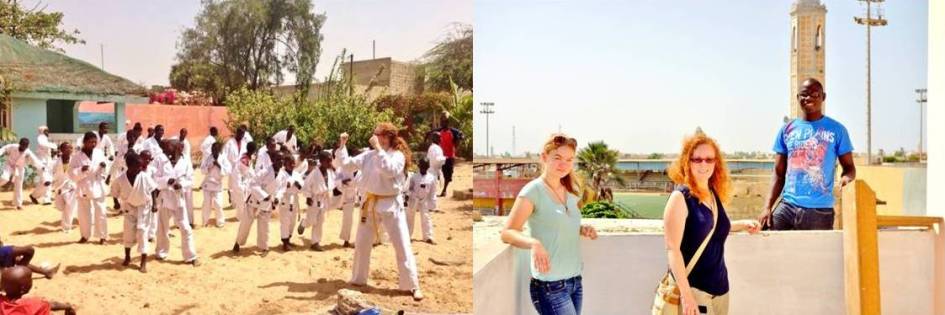News from Maison de la Gare
A Family Affair
Tweeter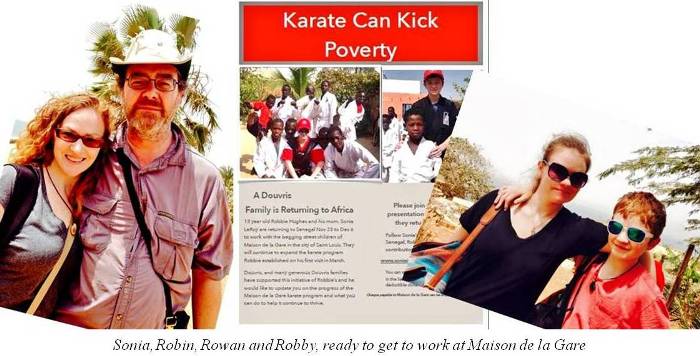
Sonia LeRoy shares the story of her family’s journey with Maison de la Gare
As soon as I arrived at the narrow,
unmarked alley in the Sor district of Saint Louis, leading to Maison de la Gare’s
welcome centre, I heard my name being called and spotted six familiar faces. Small,
barefoot, filthy, 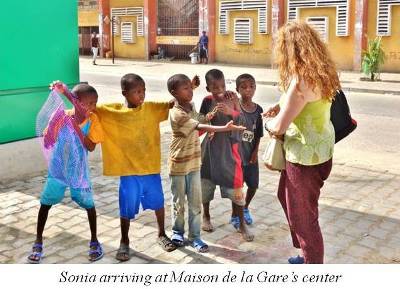 delightful, smiling street boys. The clamor and dusty chaos of the
busy street receded as each child rushed forward for a proper hand clasp greeting.
Several repeated my name, wanting to ensure I knew that they know me. Their welcoming
smiles grew bigger when I began to pass out candy and the group of six instantly,
miraculously, became a demanding horde of twenty. When will I learn? Some of the
original six shook their heads at me knowingly. They accompanied me down the alley,
leading me by the hand, touching my arm, sneaking more shy smiles, and repeating
their own names, anxious to confirm that I also knew them.
delightful, smiling street boys. The clamor and dusty chaos of the
busy street receded as each child rushed forward for a proper hand clasp greeting.
Several repeated my name, wanting to ensure I knew that they know me. Their welcoming
smiles grew bigger when I began to pass out candy and the group of six instantly,
miraculously, became a demanding horde of twenty. When will I learn? Some of the
original six shook their heads at me knowingly. They accompanied me down the alley,
leading me by the hand, touching my arm, sneaking more shy smiles, and repeating
their own names, anxious to confirm that I also knew them.
Upon entering the sanctuary of Maison de la Gare, all I saw were smiles and all we
felt was welcome. "Sonia!", "de retour!", "combien de temps cette fois?", "et la
famille?", "et Robbie cette fois?", "Rowan?" It takes hours to greet everyone
properly, re-confirm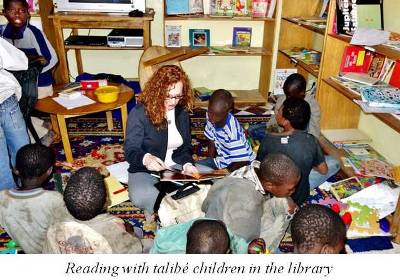 their understanding of their importance to me and mine to them.
To be updated on recent illnesses, abuses and triumphs.
their understanding of their importance to me and mine to them.
To be updated on recent illnesses, abuses and triumphs.
The progress at the centre is encouraging. The coconut trees have finally taken
hold, no longer in danger of succumbing to stray soccer balls or wrestling children.
The papayas have survived the season of wind and sandstorms to stand tall and bear
fruit. The nurse in the infirmary will help organize the medications we
brought to stock the clinic. The children attend class, play games, tend the
garden, wash clothes, read in the library, follow their interests and friends on
Facebook at the computer centre, and karate classes continue.
Souleymane, whom I love as family, proudly announces earning his orange karate
belt and his commencement of sparring competition. Arouna, another I love as my
own, updates me on the progress of his hard earned education. He is finally
attending high school but, although freed from forced begging, still has to deal
with the domination and interference of his marabout. Arouna dreams about
university, of teaching 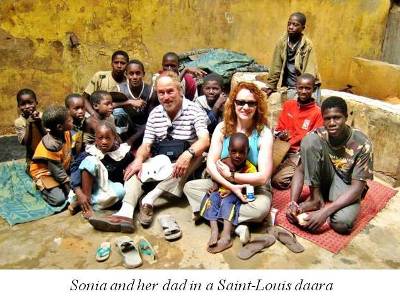 and writing, anxious to himself become an agent of change.
I dream about finding him a scholarship to help make it happen.
and writing, anxious to himself become an agent of change.
I dream about finding him a scholarship to help make it happen.
The very first time I made this journey with my father in 2010, I had no idea
what to expect. I had always longed to step outside my comfort zone to give back
to those without any resources to help themselves. Thanks to my father's
invitation to join him on his third trip to Senegal, I was getting the chance
to do just that. We were flying toward a level of poverty and human rights abuse
beyond my experience or comprehension. How could I, a person who leads people to
take control of their money in support of life objectives, have anything to offer
to those without a penny in the world or objectives other than survival?
I quickly fell in love with these children, their beauty, resilience and humour,
all in the face of unimaginably intolerable circumstances. They are known as
talibés. There are tens of thousands of them in Senegal, all boys. They are
supposed to be studying the Quran, but instead are forced to beg for quotas of
money for their marabouts. Often severely abused and neglected by distant
families, talibés beg for up to ten hours a day. Human Rights Watch and the
United Nations refer to the talibés as modern day slaves. The government and
society in general turn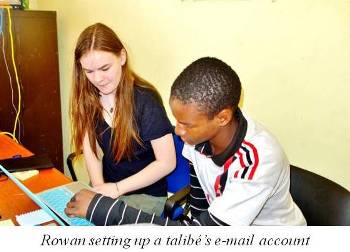 a blind eye. Someone else is always to blame: the
government, parents, the marabouts, police who fail to enforce the law. No one
but Maison de la Gare seems willing to take responsibility for these innocents.
a blind eye. Someone else is always to blame: the
government, parents, the marabouts, police who fail to enforce the law. No one
but Maison de la Gare seems willing to take responsibility for these innocents.
The first time I encountered a talibé child the age of my own son and nephews,
I had an overwhelming sense that, but for the grace of God or an accident of
birth, these could be my own children. And, if I could help them, I knew that
I must. What makes me, or any of us in the West, any more deserving of
prosperity, health, security, opportunity and hope than these children who have
perpetrated nothing to earn their circumstances but be born in this time and
place.
Since that first visit I have returned a dozen times to continue to work with
Maison de la Gare, often with my father, to help build the center according
to founder Issa Kouyate's vision and to do what I can to help the Senegalese
staff help the children to maintain hope and find a way to a better life.
Over the years at Maison de la Gare, I have taught the children English,
French and karate. I have been a project manager and a tour guide. I have
tended wounds and de-wormed kids in the daaras and in the health clinic. I
have been a gardener, a painter, a labourer, a mentor and a mother and a
friend. My family's charitable foundation and my Dad's grant writing
patience facilitates the funding of much of the progress here, funded with
the help of many 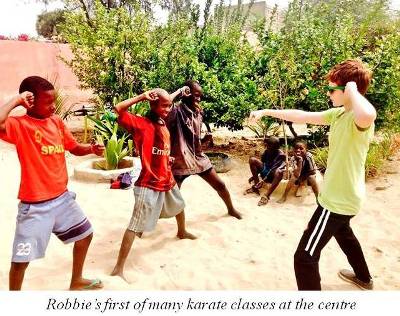 sympathetic contributors. All of the investment companies
I work with have contributed. My Dad manages the books and maintains the
website that helps fuel more donations and a thriving international volunteer
program. We both write regular articles to keep the donations flowing. And,
all the while, these children have truly become a second family to us.
sympathetic contributors. All of the investment companies
I work with have contributed. My Dad manages the books and maintains the
website that helps fuel more donations and a thriving international volunteer
program. We both write regular articles to keep the donations flowing. And,
all the while, these children have truly become a second family to us.
Four years ago my then 14 year old daughter, Rowan, accompanied me to Senegal
for the first of five times (so far). She connected with the talibés in a
manner that only a young person could do. Rowan saw the talibé children as
equals, with the same unlimited potential that she knows herself to have.
She saw them in a way they likely had never seen themselves, never
considering potential limitations of kids who could barely read or write or
had never seen a computer. Rowan helped establish email accounts for the
talibé children. She knew that a connection with the outside world and with
herself back in Canada, the possibility of maintaining long term links with
international volunteers, regular exposure to different world views, and the
acquisition of skills valued by modern society could benefit the talibés
immeasurably. These are surely now the most on-line-savvy begging street
kids in Africa!
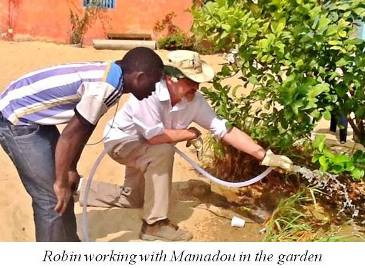
A year and a half ago, my husband Robin and my son Robbie joined Rowan and
I on their first visit to volunteer with Maison de la Gare. Then
13-year-old Robbie, like Rowan before him, envisioned possibilities for the
talibés that most adults could not have conceived of. Appreciating the
advantages his sport of karate has to offer the talibés, discipline,
confidence, self-defence skills, and the sense of belonging to something
special, Robbie convinced us to facilitate a karate program for the talibés
of Maison de la Gare. Today, the pride the boys take in their white gi
(karate kimonos) and belts, donated from Canadian dojos, is evident.
During Robbie's second visit with me last December, we were invited to
watch some Maison de la Gare talibés earn higher belts. Their confidence
was palpable, and their pride in achievement was irrepressible. Robbie
with his black belt, who is of an age with many of them, is an example and
helps to spread the belief that anything is, indeed, possible.
Even for talibés.
Perhaps the most impact we have on the children of Maison de la Gare lies
simply in our example, 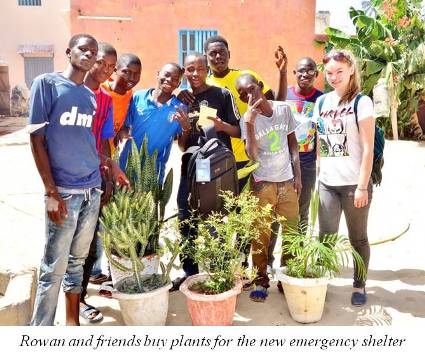 and our interest. Maison de la Gare tries to teach
them they are worthy of so much more. The simple presence of
international volunteers underscores this truth. And, the presence of
children competently volunteering demonstrates to the talibés how
powerful kids can be.
and our interest. Maison de la Gare tries to teach
them they are worthy of so much more. The simple presence of
international volunteers underscores this truth. And, the presence of
children competently volunteering demonstrates to the talibés how
powerful kids can be.
My family and I ventured to Africa in search of giving. And, I know we
did. I know it for the progress I see: the smiles on the faces, the
amputations averted thanks to antibiotics, the enrolments in school, the
philosophical conversations started about society's role in forced
begging, the pride in achievement, the white karate belts transforming
to coloured belts, the late night emails received and Facebook chats I
am invited to every time I am on-line. But what we receive is far
greater. Interacting with these kids not only inspires me that absolutely
anything is possible, it gives me a sense of being completely present
and alive. It has transformed my and my children's paradigms. No one
does this work in order to receive. But, it is inevitable, as anyone
who gives knows.
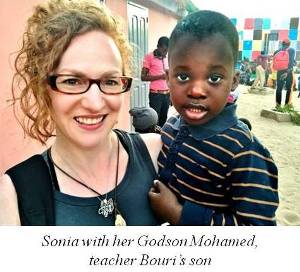
Volunteering with Maison de la Gare as a family has brought unimaginable
gifts to us. Doing this work together as a family has brought us closer
together and has helped us better appreciate our own advantages and
opportunities while expanding our perspectives on just about everything.
International volunteering can be successful and rewarding for anyone.
Students, retirees, couples, youth groups, individuals and now families
have left their mark on Maison de la Gare. And Maison de la Gare, its
dedicated staff and founder Issa and the talibés of Saint Louis have,
in turn, left their mark on every volunteer who has stepped through
their doors.






















